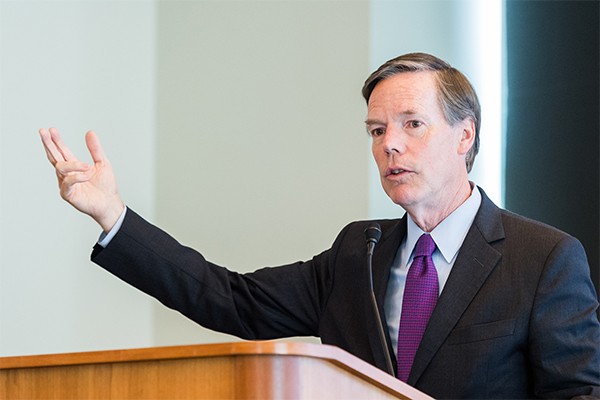MIT Announces 9 African Startup Challenge Finalists, and More – Boston News

Let’s explore some of the most interesting stories that have emerged from Boston business schools this week.
These 9 African Startups are Working Toward a More Inclusive World – MIT Sloan Newsroom
MIT Sloan recently announced the nine African startup finalists of The Initiative on the Digital Economy’s Inclusive Innovation Challenge, all of which use technology to “reinvent the future of work.”
Initiative Director Erik Brynjolfsson writes, “If we employ inclusive innovation globally, it could be the best thing that ever happened to humanity. We can have more wealth, better health, and widely held prosperity.”
Here are the 9 African finalists:
- Wefarm provides a “mobile network accessed through SMS, where millions of small-scale farmers can share information.”
- PrepClass connects students and tutors.
- Wesabi connects “skilled laborers to individuals and businesses.”
- Lynk is an “online platform that operates as a hiring service and also a showcase for artisans.”
- Brave Venture Labs provides “talent sourcing software for growing companies.”
- Moringa School “teaches software development and offers professional skills training.”
- Safi Organics “provides small-scale farmers with affordable fertilizer for their crops.”
- Solar Freeze “offers mobile cold-storage units for small farmers to help reduce crop spoilage.”
- AgroCenta is a “digital platform for rural, small-scale farmers to connect with buyers and access financial services.”
The finalists, who will travel to Nairobi, Kenya in late August to “pitch their ideas at a regional competition,” were selected from almost 200 entrepreneurs from 16 countries.
You can read more about the African startup contenders here.
Collaborate, But Only Intermittently, According to New Study by Harvard Business School Professor and Colleagues – Harvard Business School News
HBS has published new PNAS research, which suggests that always-on technologies like Slack, email, and social media are less effective at complex problem solving than “intermittently on.”
HBS’s Ethan Bernstein, along with BU Questrom’s Jesse Shore, and Northeastern’s David Lazer believe their research could have widespread implications on the workplace, such as “alternating independent efforts with group work over a period of time to get optimal benefits.”
Bernstein writes, “As we replace those sorts of intermittent cycles with always-on technologies, we might be diminishing our capacity to solve problems well.”
You can read more about the research here.
Sizing up Markets, Peering into the Future – Carroll School News
BC Carroll recently hosted its annual Finance Conference in which financial experts delivered a surprisingly “upbeat forecast” on global investment, tech innovations, and cryptocurrencies.
Of the conference’s goals, John and Linda Powers Family Dean Andy Boynton ’78 writes, “We want our students to become lifelong learners, people who look for ideas in many different places. We want them to think both deeply and broadly, and to become great leaders for the future.”
Despite the relative stasis of the larger economy, Harvard’s Kennedy School of Government Professor Nicholas Burns ’78 described this particular moment in American history “consequential” and “chaotic” from a global economy standpoint.
Burns explains that “high on his list of global challenges for the United States is the rising dominance of nations to the East, especially China and India,” particular when the U.S. has not employed “skillful diplomacy and strategic thinking” to accommodate this “coming shift in global power.”

Nicholas Burns (’78), speaking recently at BC Carroll / Photo via bc.edu
He said, “There’s no question that by the next century, we’ll be a Pacific world,”
You can read more about the conference here.
Employee Surveillance, Startup Contests, and More – Boston News

Let’s explore some of the most interesting stories that have emerged from Boston business schools this week.
The Surprising Effects of Employee Surveillance – Questrom School of Business Blog
BU Questrom School of Business professor Michel Anteby recently co-authored new research that explores the ways in which increased surveillance of employees can lead “to workers’ strikes and sometimes even quitting their jobs altogether.”
The article points to a 2011 experiment where TSA managers installed cameras to monitor officers “as an attempt to stop the disappearance of baggage in airports.” According to TSA officers, they felt they “as though their managers were merely looking for a reason to discipline them.”

New BU research finds that workplace scrutiny often leads to a worse work environment, even if it is inadvertently / Photo via bu.edu
According to Anteby’s research, “under such scrutiny, one tends to lose sight of the bigger picture, which ends up with employees feeling undervalued and over scrutinized.”
You can read the full article here.
These 12 European Startups Are Using Technology to Improve Opportunities For Low-And Middle-Income Workers – MIT Sloan Newsroom
The MIT Initiative on the Digital Economy’s Global Inclusive Innovation Challenge announced its 12 European finalists, all of which are working to improve economic opportunity for workers. According to the article, “the competitors are judged on vision, impact, participation, and scalability.”
Initiative Director Erik Brynjolfsson writes, “If we employ inclusive innovation globally, it could be the best thing that ever happened to humanity. We can have more wealth, better health, and widely held prosperity.”
According to the article, the European finalists will travel to “Darmstadt, Germany, in early September, where they will pitch their ideas at a regional competition. The winner of each category then goes on to compete in November during the Global Grand Prize Gala at MIT. The gala includes four $250,000 prizes, one for each category.”
The 12 European finalists, organized by category, are as follows:
Skills Development and Opportunity Matching
- Data4You, an all-ages coding boot camp.
- Jobiri, which “assists people with finding jobs through an AI-driven career adviser.”
- micro:bit, which “provides tiny programmable computers for students and teachers.”
Income Growth and Job Creation
- ABURY’s “Design meets Craft” connects “designers and artisans through a digital platform to find creative project partners, and connect with the global market.”
- mecasa is an “online platform connecting caretakers with senior individuals who need daily support.”
- ProGlove is a “smart glove designed to scan and streamline manufacturing and logistics work.”
Financial Inclusion
- hiveonline is a “mobile platform offering small- and micro-businesses administrative help and access to financial services.”
- Trezeo, which “provides a mobile financial platform for independent workers.”
- Sherpa, which “offers insurance to people who are self-employed, freelancers, contractors, and other entrepreneurs.”
Technology Access
- BLITAB, a “tactile tablet designed for blind and visually-impaired users.”
- Pangea Electronics “builds sustainable and eco-friendly technology.”
- Teqmine Analytics uses “AI to help customers with their research and development questions.”
You can read more about the event here.
Think You’re Having a Heart Attack? If You’re a Woman, Insist on a Female Physician – Harvard Business School News
New PNAS research co-authored by HBS Associate Professor Laura Huang, along with the University of Minnesota-Twin Cities’ Brad Greenwood and Washington University in St. Louis’ Seth Carnahan finds that of “more than 500,000 heart attack patients admitted to hospital emergency departments in Florida between 1991 and 2010, female patients treated by male physicians were less likely to survive than patients of either gender treated by female physicians or male patients treated by male physicians.”
Moreover, “survival rates among female patients treated by male physicians improved with an increase in the percentage of female physicians in the emergency department and an increase in the number of female patients previously treated by the physician.”
In “Patient-Physician Gender Concordance and Increased Mortality Among Female Heart Attack Patients,” the researchers write:
“These results suggest a reason why gender inequality in heart attack mortality persists: Most physicians are male, and male physicians appear to have trouble treating female patients. If female patients tend to be more challenging for male and female doctors to diagnose and treat, the patterns we document may reflect the fact that the most skillful physicians (i.e., female physicians) provide the highest return to their skills when treating the most challenging patients (i.e., female patients).”
You can read more about the research here.
MIT Sloan Celebrates 4th Annual Women’s Week in 7 Cities Worldwide

The MIT Sloan School of Management’s #MITSloanWomen campaign just celebrated its fourth anniversary. One of the cornerstone events of the campaign, which offers female prospective applicants and current MBA students new ways to interact with the school and build their post-graduation careers, is the annual Women’s Week.
Since 2014, Women’s Week has brought female MIT Sloan alumnae and the Sloan admissions team to cities across the United States and abroad to interact with women interested in the Sloan MBA. The events are designed specifically for female MBA applicants and offer deep-dives into what it means to be a Sloan woman.
“Women’s Week is a great chance to hear stories from MIT Sloan female alumnae who are making an impact,” explained Shauna LaFauci Barry, the associate director of admissions at MIT Sloan. “It is a unique opportunity to network with a community of women who are exploring the MBA.”
Women’s Week took place this past July in seven cities around the world: Washington, DC; Cambridge, MA; San Francisco, Chicago, Seattle, New York City, and London. Women gathered at each location to enjoy a featured TIMTalk (Think. Inspire. Motivate), as well as a panel of local female alumnae from the two-year MBA, Sloan Fellows MBA, and Executive MBA programs.
The events were a resounding success.
“This year’s events surpassed 1,000 women registered,” explained Barry. “There were 1,600 registrants for over seven events including one live stream. This even included two new cities: Seattle and London.”

To learn more about the success of Women’s Week and what it was like to attend, we reached out to Shauna LaFauci Barry for an in-depth chat.
Women’s Week 2018 Theme
The theme of this year’s events was “MIT Sloan Women: Creating Ideas Made to Matter,” and their focus was on celebrating Sloan women who are making an impact.
According to Barry, all of the alumnae panelists were “incredibly accomplished, articulate, thoughtful, [and] authentic. Each one brought something unique to the event. We were so grateful to have such great MIT Sloan Women Ambassadors.”
Meet the San Francisco Women’s Week TIMTalk Speaker
Barry was particularly impressed by Sephora Innovation Lab Senior Manager Nelly Mensah (MBA ’15), the San Francisco’s TIMTalk speaker. In her talk, Mensah discussed the importance of creativity, collaboration, and being value-driven.
“I am still singing her praises in my mind,” said Barry. “She was agile and adaptable. When my computer started rebooting right before her slide presentation, she rolled with everything. She brought a great sense of humor to her talk—a vulnerability and honesty on the importance of creating a culture at Sephora Innovation Labs where innovation ripples through.”
Mensah tied everything in her talk into the culture of MIT Sloan, her activities while in school (Retail Club, internship in Milan, etc.), and how they contributed to where she is now. There were three key takeaways:
- Cross-Cultural Collaboration: At MIT Sloan, Mensah was part of the Hacking Arts. Now, she runs Hackathons at Sephora.
- Creating Space and Time for Creativity: There is always an opportunity to be creative; make time for it and make sure you get input from people throughout the organization.
- Be Value-Driven: Sephora feels strongly about their value of empowering women, and all of their activities align with this (i.e. Women Who Code).
Women’s Week Takeaway
Barry explained what she hoped attendees would take away from not just the San Francisco event, but every Women’s Week event. “We want them to be energized about their own ideas and to see how an MBA from MIT Sloan can help them achieve their goals,” she said. “We want them to learn something new and come away from the event wanting to explore more.”
Why Women’s Week?
Here are just a few reasons why a prospective female MBA candidate should attend next year’s MIT Sloan Women’s Week:
- It offers excellent exposure to a variety of stories from MBA women at various stages of their careers.
- It showcases how the MIT Sloan MBA has served as a gateway to making women’s ideas matter.
- It inspires attendees to imagine what might be possible in their future.

Coming Soon
Fret not if you missed this year’s Women’s Week. You still have a chance to attend a few female-focused events by registering for one of MIT Sloan’s Women’s Ambassadors Days this fall. The first event, MBA Women’s Visit Day, occurs on October 12 and will feature faculty member Gita Rao discussing finance and action learning at MIT Sloan. You can register here.
Other events include the Women’s Ambassadors visits, which allow women to come to class for an on-campus visit, attend a class, and join a member of the Admissions Office for a presentation about the school.
- October 29: MBA Women’s Ambassadors Program Morning Visit
- October 29: MBA Women’s Ambassadors Program Afternoon Visit
- November 19: MBA Women’s Ambassadors Program Morning Visit
- November 19: MBA Women’s Ambassadors Program Afternoon Visit
- December 6: MBA Women’s Ambassadors Program Morning Visit
- December 6: MBA Women’s Ambassadors Program Afternoon Visit
Where Have All the New Ideas Gone? – Boston News

Let’s explore some of the most interesting stories that have emerged from Boston business schools this week.
New Ideas are Getting Harder to Find—and More Expensive – MIT Sloan Newsroom
MIT Sloan recently examined just how difficult is it to come up with new ideas in an age of seemingly infinite access.
A new National Bureau of Economic Research study published by MIT Sloan Professor of Applied Economics John Van Reenen, Stanford University professors Nicholas Bloom and Charles I. Jones, and Stanford Doctoral candidate Michael Webb finds that “the productivity of scientific research is falling sharply across the board” due in large part because “researchers are putting in more and more effort to sustain the same—or even a slightly lower—pace of idea generation as we experienced half a century ago.”
Van Reenen writes, “As the total amount of knowledge becomes larger and larger and larger, it becomes increasingly difficult to get to its frontier of that knowledge. It was much easier a couple thousand years ago.”
Two workarounds are to narrow the “focus of one’s studies to specialize in a very particular domain” and expand investment into research. However, both solutions arrive with their own sets of challenges, according to Van Reenan.
“In order to carry on innovating, you’re constantly working together, and it’s very complicated to get all of these people and ideas together.”
Van Reenan is concerned that government investment into scientific research is simply not enough of a high priority.
“I think a lot of the time you hear we’ll just cut the top tax rates to generate lots of innovation — I’m pretty skeptical about that in terms of the incentives you’re going to give. Both have positive effects on growth and equality. Instead of giving away $5 trillion in tax cuts, use that to invest in growth opportunities for the future.”
You can read the full article from MIT Sloan here.
No More General Tso’s? A Threat to ‘Knowledge Recombination’ – Harvard Business Week
HBS Technology and Operations Management Unit Assistant Professor Prithwiraj “Raj” Choudhury is set to publish a new Strategic Management Journal paper that explores the “role ethnic migrants play within the work force,” as well as the “new technologies in countries where they’ve migrated.”
Choudhury points to examples throughout history like Soviet mathematicians who “came to the United States in the 1990s after the fall of the Soviet Union; far ahead in fields like partial differential equations and symplectic topology, they helped their American counterparts solve otherwise intractable problems,” American Chinese cuisine staples like General Tso’s chicken and chop suey, and Indian immigrants who brought double-entry bookkeeping to South Africa in the late 19th century.
Choudhury uses ‘The Ethnic Migrant Inventor Effect: Codification and Recombination of Knowledge Across Borders,’ written with HBS doctoral student Do Yoon Kim, as a launch pad to discuss immigration through the lens of knowledge production rather than job creation—or absorption.
“Instead of seeing migrants through the lens of whether they create jobs or not, we should view migrants as carriers of knowledge—knowledge that could be further recombined by locals. If H1-B was scrapped, or Europe stopped admitting skilled migrants, the knowledge production of the global economy would suffer.”
Choudhury adds, “It’s not only a loss to the firms, it’s also a loss to local workers, who will lose out if they do not imbibe this knowledge from migrants. I would turn the debate on its head and say, it’s not about destroying or creating jobs, it’s about participating in or losing out on creating knowledge.”
You can read the full article here.
Coffee Break – Sawyer Business School
MassChallenge, the self-described “most friendly start-up accelerator on the planet” recently selected WarmUp Protein Coffee, a “coffee-cum-protein beverage” developed by Sawyer Business School alum James Testa (BSBA ’17) as part of Sawyer’s “Crowdfunding the Venture” class.
Testa writes about how getting rejected from last year’s competition sent him back to the drawing board and enabled WarmUp to stand out among the other 1,600 applications. In a recent interview with his alma mater, Testa says:
“I spent all year getting the product out there, building the business, and getting some sales. So when I went back to MassChallenge this year, I feel like I had a much better grasp of my business and who my customers were. And because I had real sales, I was a lot more confident about it. The proof of concept was already there.”
MassChallenge start-ups “get free office space, connections to industry-specific mentors, advice from venture capitalists, and the chance to win up to $1.5 million to help launch a business.”
You can read the full article here.
Religious Spending, Taking Risks, and More – Boston News

Let’s explore some of the most interesting stories that have emerged from Boston business schools this week.
Shoppers with Strong Religious Beliefs Spend Less and Make Fewer Impulse Purchases – Harvard Business Review
The Harvard Business School recently published an article in the Harvard Business Review that illuminates a fascinating correlation between grocery spending and religiosity—as the latter rises, the former falls.
The researchers write, “We found that for each 20 percent increase in the number of religious adherents in a county, annual grocery sales per store decreases, on average, by about $125,000. [Our] results showed that shoppers living in more religious U.S. counties spent less money on groceries and also made fewer impulse purchases than those living in less religious U.S. counties.”
The implications of the research are vast and wide reaching, particularly for retailers. They explain further:
“Because being reminded about God increases shoppers’ frugality, they may be more sensitive to price discounts and promotions (such as “buy one, get one free”) around the time of religious holidays and observances. Getting a good deal, particularly on an impulse buy, is likely to alleviate shoppers’ heightened frugality.”
The researchers also speculate that “retailers may also allay religious shoppers’ concerns about being frugal by offering deals that demonstrate respect for their values, such as promising to donate a percentage of revenue from a particular product to a local charity.”
You can check out the full article here.
When Regulation Doesn’t Throttle Risk-Taking – Questrom School of Business Blog
New Management Science research from Questrom School of Business Accounting Professor Ana Albuquerque and Fudan University’s Julie Lei Zhu finds the positive impacts of the 2002 Sarbanes-Oxley Act (SOX), which required companies to implement internal controls on financial reporting.
According to the article, “not only did filing firms not decrease their investment activities, some measures suggested that firms actually increased their investments after the reporting requirements were put into place. Filing firms also appeared to benefit in other ways. Banks typically offered filing firms larger loans with lower collateral requirements compared to non-filing firms.”
Albuquerque writes, “Credit terms improved [for filing firms], because they were disclosing more information. The benefit was higher than the cost of compliance.”
You can read more here.
These 12 startups are Re-Imagining the Latin American Workplace and Workforce – MIT Sloan Newsroom
MIT Sloan recently announced the 12 Latin American finalists of the its global Inclusive Innovation Challenge, all of which will travel to São Paulo, Brazil in just a few weeks “where they will pitch their ideas at the IIC Latin America Celebration.”
According to the article, “the winner of each category then goes on to compete in November during the Global Grand Prize Gala at MIT. The gala includes four $250,000 prizes, one for each category.”
Initiative Director Erik Brynjolfsson writes, “If we employ inclusive innovation globally, it could be the best thing that ever happened to humanity. We can have more wealth, better health, and widely held prosperity.”
Here’s a quick overview of each of the 12 Latin American finalists:
- Interacpedia “connects university student teams with organizations to generate the development of new skills/jobs and opportunities.”
- Signa is a “platform that provides deaf people with online digital economy courses.”
- Sumá is a “fair marketing platform that connects family farmers with food buyers.”
- Alò Bodega is a “mobile app for Latin American and Asian corner stores.”
- Apli is an “artificial intelligence-enabled jobs marketplace.”
- Incluyeme is an “online job portal for people in Latin America with disabilities.”
- Grupo Nueva Economía is “developing new digital channels for small businesses and entrepreneurs.”
- Outbound Initiative “connects innovators from underrepresented regions — in this case Brazil — with business opportunities using data-combing artificial intelligence.”
- RedeDots is a “social network of more than 220,000 people engaged in the fair trade and sustainable business market.”
- LEVEE “uses machine learning, geolocation, and mobile messages to connect people with job opportunities.”
- Trocafone “aims to reduce e-waste by creating a marketplace for used electronics.”
- UnDosTres “offers Mexico residents mobile payment for services like prepaid cellphone recharging, movie ticket purchases, electricity, and phone bills.”
You can read more about the startups here.
Fighting Fake News, Working Mothers, and More – Boston News

Let’s explore some of the most interesting stories that have emerged from Boston business schools this week.
Lazy Thinking, Not Political Bias, Drives Fake News – MIT Sloan Newsroom
MIT Sloan Associate Professor David Rand and the University of Regina’s Gordon Pennycook recently published a new study that illuminates what actually perpetuates fake news—a “lack of analytical thinking.”
Professor Rand writes, “Our study suggests that falling for fake news is a symptom of cognitive laziness rather than motivated reasoning or self-deception. That is, contrary to popular belief, it is not the case that people are thinking too much about the wrong things. Rather, a little thinking might go a long way to fix the problem of fake news.”
In a study that surveyed “3,446 participants to rate the accuracy of headlines from actual news stories from Facebook,” the duo found that “people who engage in more analytic thinking, as measured by the Cognitive Reflection Test, are better at discerning true from false—regardless of identified motivations or political biases.”
You can read more about the research here.
What’s Your Carbon Footprint? You Probably Have No Idea. – D’Amore-McKim Blog
In a recently published study, D’Amore-McKim Professor Amir Grinstein surveyed 1,000 people to “guess the amount of CO2 emitted from burning one gallon of gasoline and the amount of calories in one gallon of whole milk.”
The goal was to “examine people’s knowledge of their own carbon footprint and how they can better educate themselves about the real impact they have on the environment.”
Grinstein believes that in order to change the public’s understanding of its own carbon footprints, they must have a “better understanding of how CO2 emissions play a role in everyday life allows people to decide if they’re willing to step up and change.”
Check out the full article here.
Kids of Working Moms Grow Into Happy Adults – Working Knowledge
New research from Harvard Business School Professor Kathleen McGinn found that, despite the narrative, working mothers often lead to happier and more successful children.
McGinn, the Cahners-Rabb Professor of Business Administration, says, “People still have this belief that when moms are employed, it’s somehow detrimental to their children. So our finding that maternal employment doesn’t affect kids’ happiness in adulthood is really important.”
The preliminary results of McGinn’s work were originally published three years ago, specifically regarding the career success of daughters of working mothers, in contrast to stay-at-home mothers.. When the story reached The New York Times, however, there was some obvious blow-back. McGinn recalls:
“Many decried the research as another installment of the ‘mommy wars.’ But the most common response was from mothers who suffered guilt, self-doubt, and disapproval from others. They found our preliminary results to be welcome news.”
However, McGinn’s research, which was conducted alongside Mayra Ruiz Castro of Kingston University in the UK, and Elizabeth Long Lingo of Worcester Polytechnic Institute, found that the careers of sons of working mothers were not generally effected. Rather, their attitudes were different in contrast to stay-at-home-mothers.
“Sons are influenced in other ways when their moms work. The sons of employed mothers hold significantly more egalitarian gender attitudes—even more so than the daughters of stay-at-home moms, a finding that surprised McGinn because it shows that the influence of maternal employment may even outweigh well-documented sex differences when it comes to shaping people’s mindsets about appropriate roles for men and women.”
You can read more of the ground-breaking research here.
